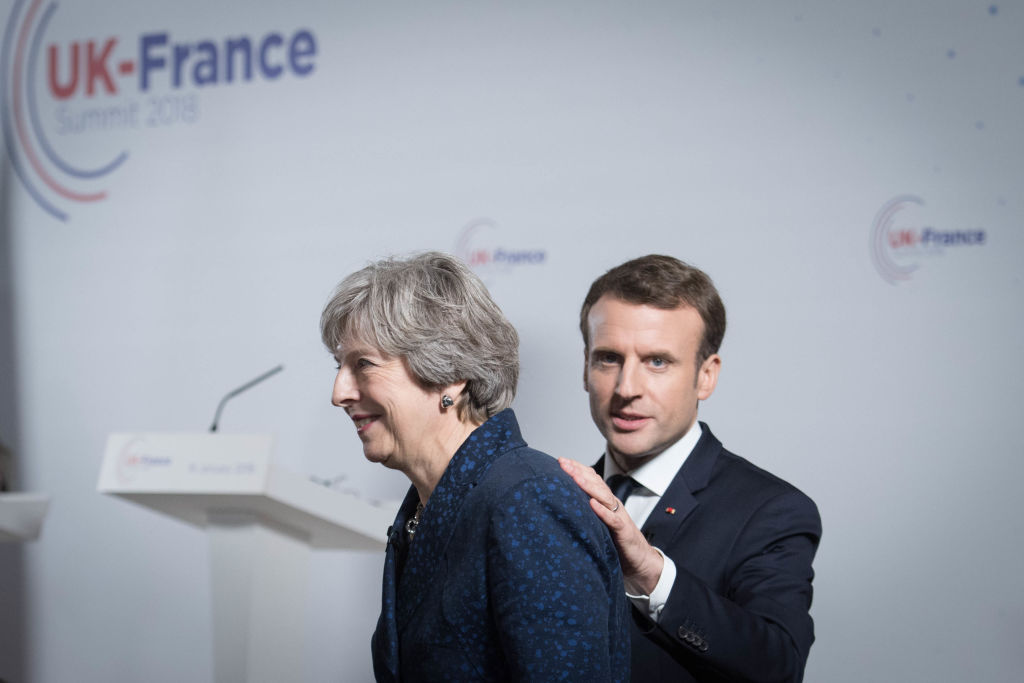Emmanuel Macron capped off his trip to Britain by taking a selfie with the Prime Minister last night. His charm offensive has paid off, says the Daily Telegraph, which suggests the visit shows what a post-Brexit relationship with Britain’s neighbours could look like. The progress in co-operation during the visit – on the migration problem in Calais and on defence, for example – is evidence, for the Telegraph, that the EU ‘is not the be-all and end-all of European co-operation’. After all, Britain’s close ties with France are matched ‘in the east’ by Poland, and ‘in the west’ by Ireland. It’s true that Macron remains opposed to Brexit and has said a decision to backtrack would be looked on ‘with kindness’. Yet for the Telegraph, the good relationship Britain appears to enjoy with France shows why a change of mind would not be a wise idea. The paper points out that ‘a former Bank of France governor, Christian Noyer’ has just admitted that warnings about the damage Britain would do to the city have been exaggerated. And the reality is that the likes of France ‘desire access to our markets as much as we do to theirs’. ‘The generally upbeat air of Mr Macron’s visit is a reason to be optimistic’, concludes the Telegraph – and shows that after Brexit, Britain can continue to make ‘dynamic partnerships with friends old and new’ rather than remain ‘tied to’ the EU.
Yesterday’s summit was a ‘meeting of equal countries’, says the Times – but ‘the same cannot be said of their leaders.’ Macron is a ‘figure of growing international influence’, while May is simply ‘clinging’ on to power. Macron’s rising star will mean that he is a vital cog in Brexit negotiations and may, suggests the Times, ‘hold the whip hand’ more than any of his fellow leaders. This could be a worry given that Macron is so understandably clear to pursue France’s interests, including his obvious desire to ‘woo…the asset managers’ who contribute so much to Britain’s economy. Macron’s approach also ‘means denying Britain the benefits of the European single market unless it shoulders the obligations’. The Times quotes an unnamed diplomat in its editorial who tells the paper: ‘the French screwed us on the way in [to the Common Market] and they’ll screw us on the way out’. So the PM’s task is a big one and involves trying to ‘persuade France that this would not be in its national self-interest’. Britain does have some trump cards in its favour, says the Times: it can offer help on intelligence to thwart terror attacks, for example. May has also shown willingness in helping France address the situation in Calais by pledging more cash. ‘In return is it reasonable to ask Mr Macron to accept the idea of continued single market access for British financial services,’ asks the Times. The answer lies with Macron. But the French president should remember that ‘a grand bargain that makes Brexit work for Britain and Europe is achievable, and it is what both countries should pursue’, concludes the Times.
But the Sun is not entirely impressed by Macron’s charm offensive. The French president ‘can think again when it comes to Britain’s taxpayers bailing out the struggling traders of Calais’, argues the paper, which says it sees no reason why British taxpayers should pay up to help those running businesses in the French town. After all, says the Sun, ‘it is not our fault Calais has been a migrant magnet so long’. The paper says it does ‘sympathise’ with the plight of traders in Calais. But ‘our towns are too’, says the Sun. Despite this, there are reasons to be positive about Macron’s visit, argues the Sun. The French president’s ’assurances of our friendship flourishing despite Brexit’s ‘short-term uncertainties’ are welcome’. ‘We hope he’s as good as his word when trade talks start,’ concludes the paper.







Comments